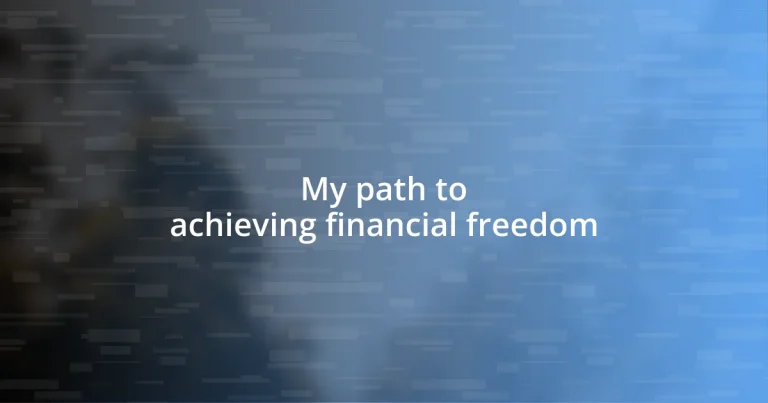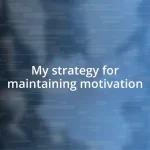Key takeaways:
- Financial freedom is characterized by the ability to make empowered choices and live life on one’s terms, going beyond just having money.
- Setting clear, specific financial goals and tracking progress are crucial for maintaining focus and achieving milestones toward financial freedom.
- Diversifying income sources and building an emergency fund are key strategies that enhance financial security and provide opportunities for growth.
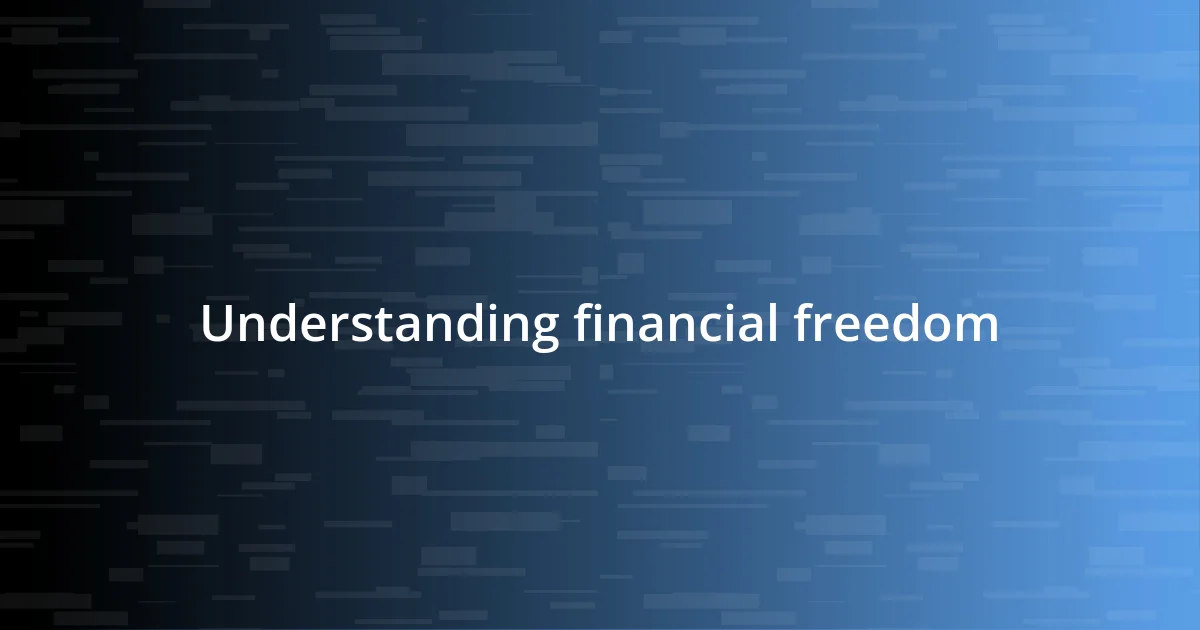
Understanding financial freedom
Financial freedom isn’t just a buzzword; it represents a state of mind and a lifestyle that many of us aspire to achieve. Personally, I remember the weight lifting off my shoulders when I realized that financial freedom means having the ability to make choices—whether it’s taking a spontaneous weekend trip or investing in a passion project, without the stress of debt looming overhead.
I often reflect on how financial freedom transcends just having money in the bank. It’s about security, peace of mind, and the ability to live life on your own terms. When I reached a point where I could confidently set aside funds for emergencies and pursuits that truly excited me, it felt liberating. Have you ever felt that rush of empowerment when you know your financial decisions align with your values?
To me, understanding financial freedom also involves recognizing the importance of a balanced approach to wealth. It’s not solely about accumulating riches but rather about cultivating a mindset that prioritizes long-term stability and happiness. The moments I chose experiences over material possessions led me to profound insights about what truly enriches life. What does financial freedom look like for you—is it having that dream home, traveling the world, or simply enjoying a stress-free cup of coffee each morning?
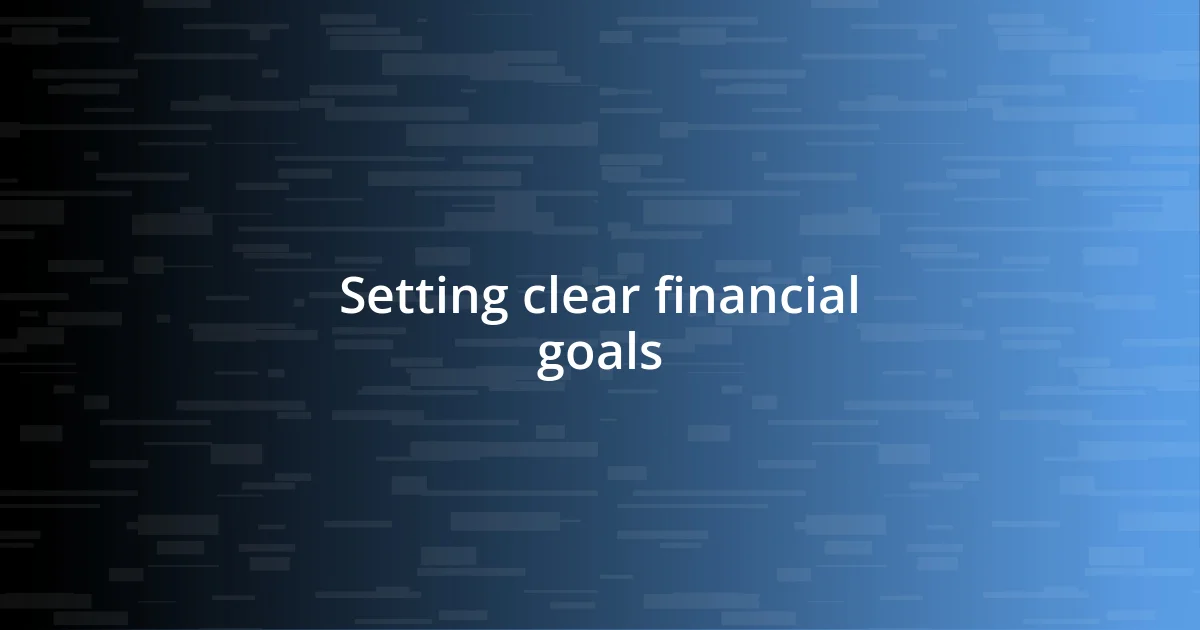
Setting clear financial goals
Setting clear financial goals is the cornerstone of achieving financial freedom. When I first started this journey, I found that without a clear vision, I was simply drifting. I remember setting small, tangible goals like saving a specific amount each month or paying off a particular debt. These milestones not only motivated me but also gave me a roadmap to follow. Have you thought about what financial goals resonate with your own aspirations?
As I refined my financial plans, I realized that specific and measurable goals were key to maintaining focus. For instance, instead of saying, “I want to save more,” I set a goal to save $5,000 within the year for an emergency fund. Tracking my progress became a gratifying experience, as every small milestone reached fueled my motivation. What achievements in your financial journey have brought you the most joy?
Creating a timeline for my goals provided structure and accountability. I often use a simple chart to visualize my progress, which keeps me engaged. When I set deadlines, I not only had a target to aim for, but I also found that it transformed my perspective on spending and saving. What timelines have you set in your journey to achieve your financial dreams?
| Type of Goal | Description |
|---|---|
| Short-term | Savings for an upcoming vacation within a year. |
| Medium-term | Saving for a home down payment over the next five years. |
| Long-term | Building a retirement fund to support a comfortable lifestyle post-retirement. |
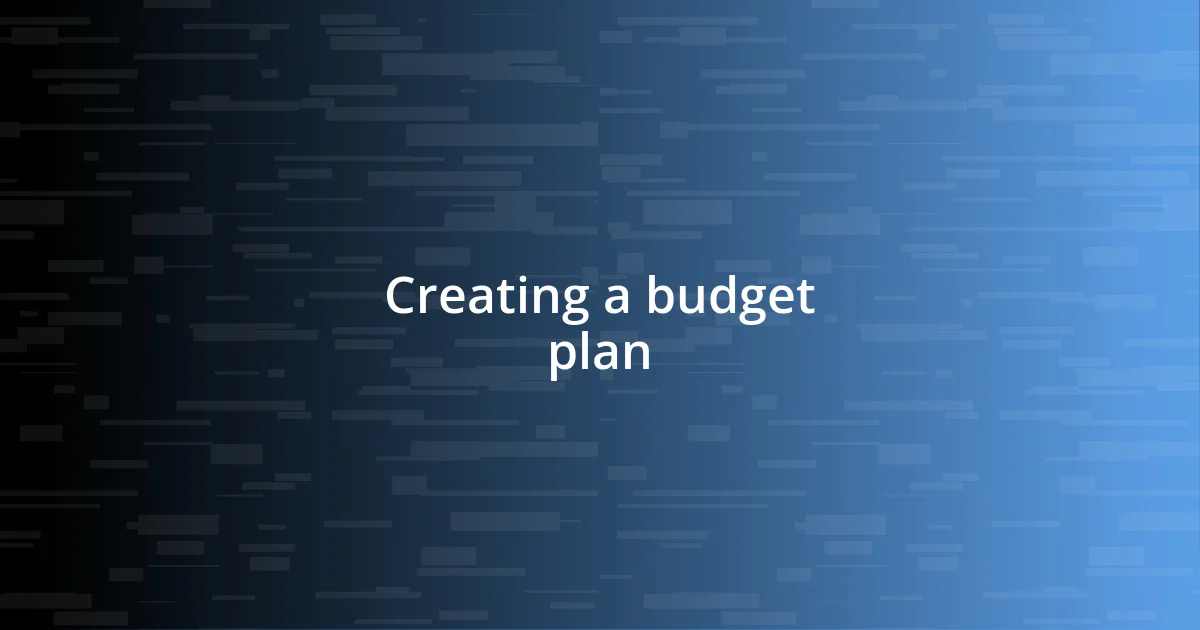
Creating a budget plan
Creating a budget plan is essential for putting me on the path to financial freedom. I remember the first time I sat down to create my own budget; it felt like I was taking control of my financial destiny. I listed all my income sources and tracked my spending meticulously. At first, it was eye-opening to see where my money was going. But it quickly became empowering as I realized which expenses I could trim and save more for my goals. It’s a rewarding process; watching your savings grow month after month ignites a spark of joy that’s hard to describe.
When devising a budget plan, I recommend breaking down your finances into three categories: essentials, savings, and discretionary spending. This allows you to allocate funds effectively while ensuring that your financial goals remain in focus. Here’s a helpful way to structure your budget:
- Essentials: Rent, utilities, groceries, insurance.
- Savings: Emergency fund, retirement contributions, travel funds.
- Discretionary Spending: Dining out, subscriptions, entertainment.
By following this framework, I not only gained clarity on my financial habits but also found freedom within my constraints. Sometimes, I would set aside a little extra for a “treat” reward for my budgeting efforts, making the whole experience feel more like a lifestyle than a chore. This balance has helped sustain my motivation, making financial management feel more like a game than a grind. How do you envision your budget planning journey?
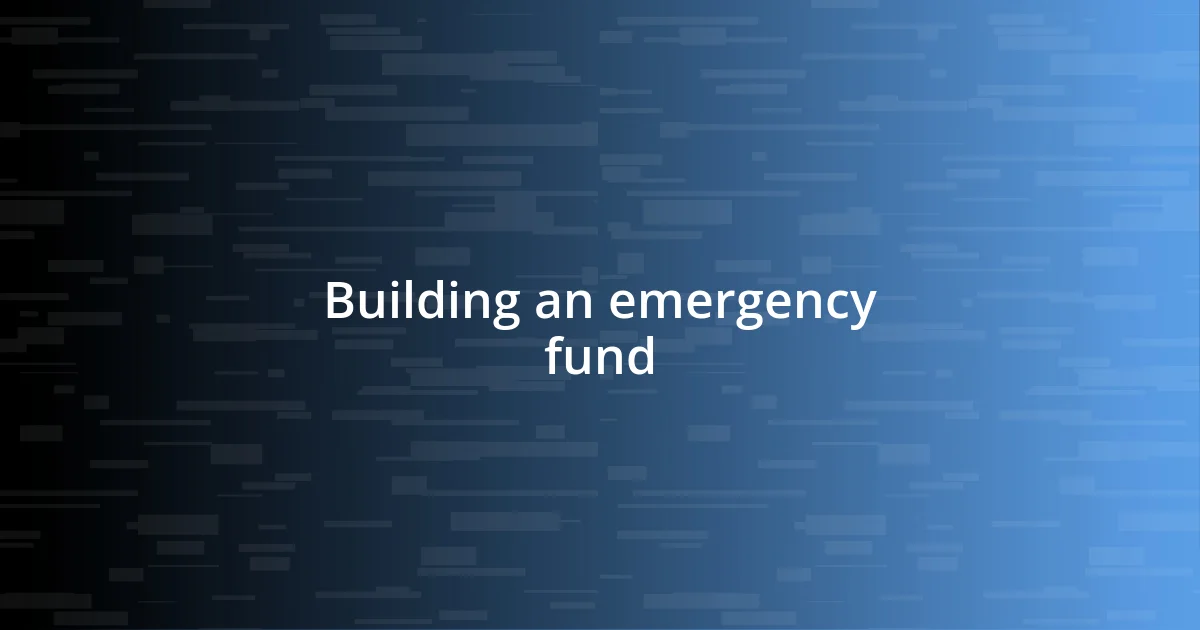
Building an emergency fund
Building an emergency fund has been one of the most significant steps on my path to financial freedom. I learned early on that life is full of unexpected surprises—like that time my car broke down right before a big work project. It was stressful, but having a dedicated emergency fund meant I could fix it without derailing my finances. Have you ever faced a sudden expense that left you feeling vulnerable?
To kickstart my emergency fund, I set a goal to save at least three to six months’ worth of living expenses. This number seemed daunting at first, but I broke it down into monthly contributions, which made it manageable. Every time I transferred those savings into a separate account, I felt a sense of accomplishment and security grow within me. I often ask myself: What could I achieve if I prioritized my savings as fiercely as I pursued my daily expenses?
As the fund began to grow, I started noticing a shift in my mindset. I felt less anxious about financial uncertainties and more empowered to take calculated risks. Life isn’t just about surviving from paycheck to paycheck; creating that safety net allowed me to invest in opportunities that would enhance my overall financial journey. What would having that peace of mind change for you?
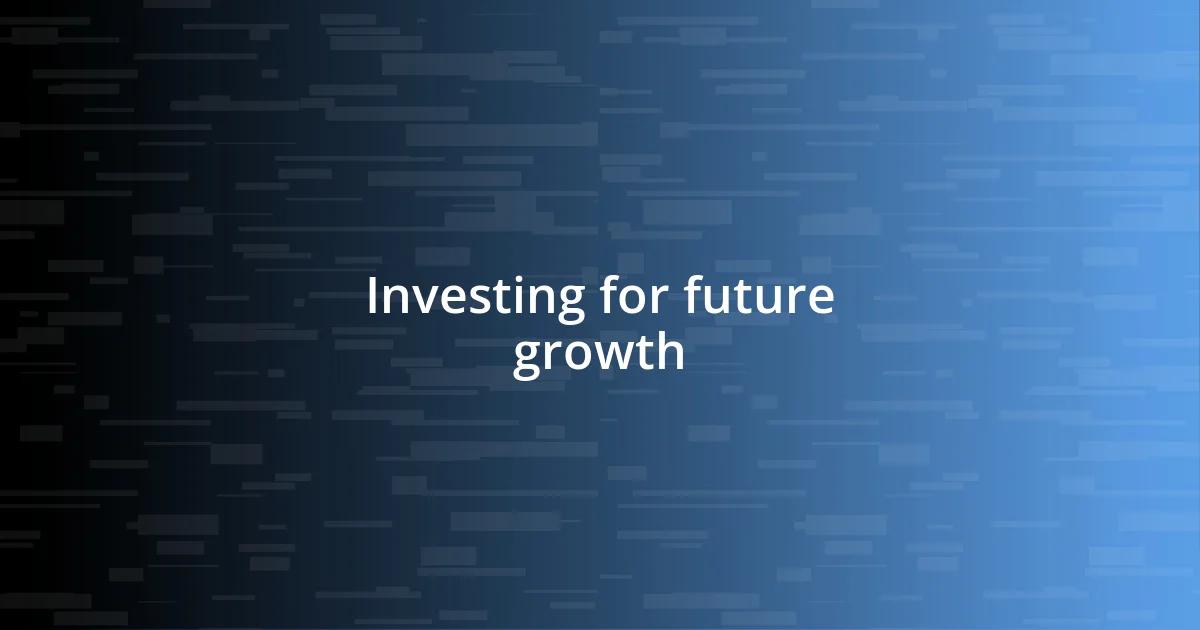
Investing for future growth
Investing for future growth has become a cornerstone in my quest for financial freedom. After establishing my budget and emergency fund, I realized the importance of putting my money to work. I remember the first time I dived into the stock market; it was daunting yet exhilarating. Watching my investments fluctuate taught me not only about risk but also about patience and the power of compound interest. Have you ever experienced the thrill of seeing your money grow over time?
As I explored different investment options, I quickly found that diversification was essential. I started with a mix of stocks, bonds, and mutual funds, each serving a unique purpose in my portfolio. I experimented with dollar-cost averaging, which helped me mitigate some of the risks tied to market volatility. This strategy made investing feel less like a gamble and more like a calculated approach to growing my wealth. When I think about my future goals, the idea of financially supporting my dreams feels achievable because I’ve laid this groundwork.
I also discovered the significance of reinvesting dividends and returns. Early on, I made a commitment to take any earnings and funnel them back into my investment accounts. This decision not only amplified my growth potential but also cultivated a habit of continuous investment that kept me motivated. I often ask myself: how would my life look if I focused on growth every single year? Each step I take towards reinvesting feels like adding fuel to a fire that can eventually blaze into a comfortable retirement. What steps are you willing to take for a brighter financial future?
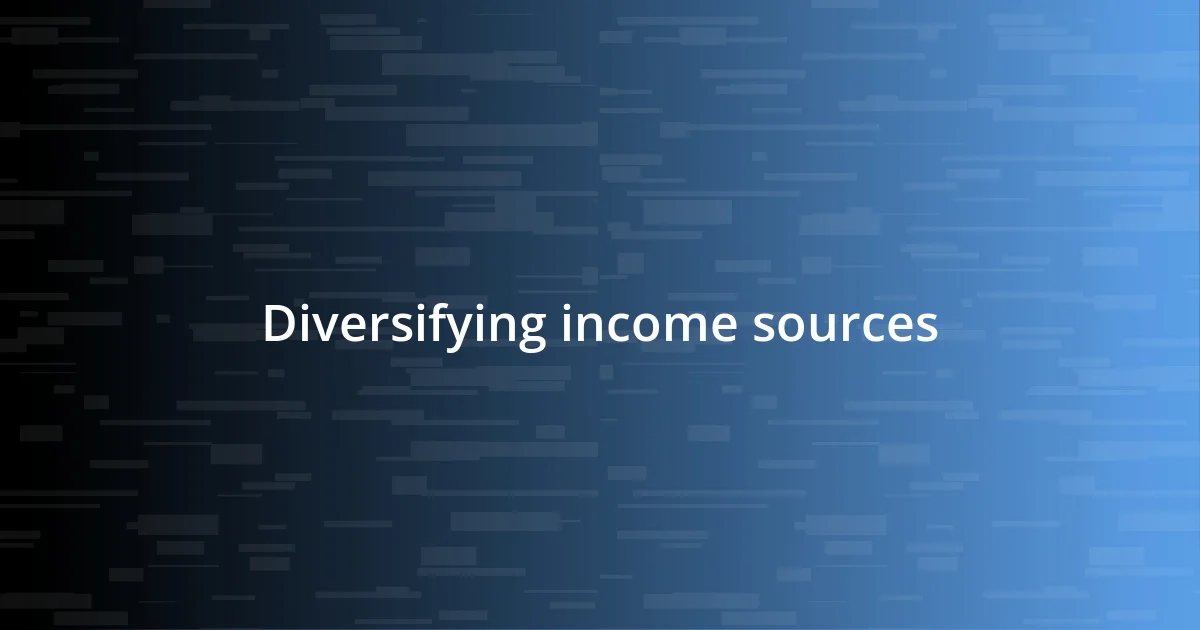
Diversifying income sources
Finding ways to diversify income sources has been a game-changer in my financial journey. I remember when I took the leap into freelance writing. Initially, it felt terrifying to venture beyond my full-time job, but the extra income became a vital safety net. Have you ever considered what skills you have that could earn you additional cash?
As I expanded my income streams, I started exploring passive income opportunities. I created an online course that stemmed from my expertise, which not only provided me with steady earnings but also allowed me to connect with others passionate about the same subject. It’s fascinating to see how creating something once can continue to pay dividends over time. How empowering would it be to earn money while you sleep?
I learned that creativity plays a crucial role in diversifying income. Whether it’s a side hustle or investing in real estate, every small step contributes to building resilience against economic downturns. For example, I rented out a room on Airbnb during peak seasons, and the extra cash helped fund my next investment venture. I often reflect on how diversifying has not only bolstered my financial security but also sparked new passions along the way. What unique opportunities have you explored to broaden your financial horizons?
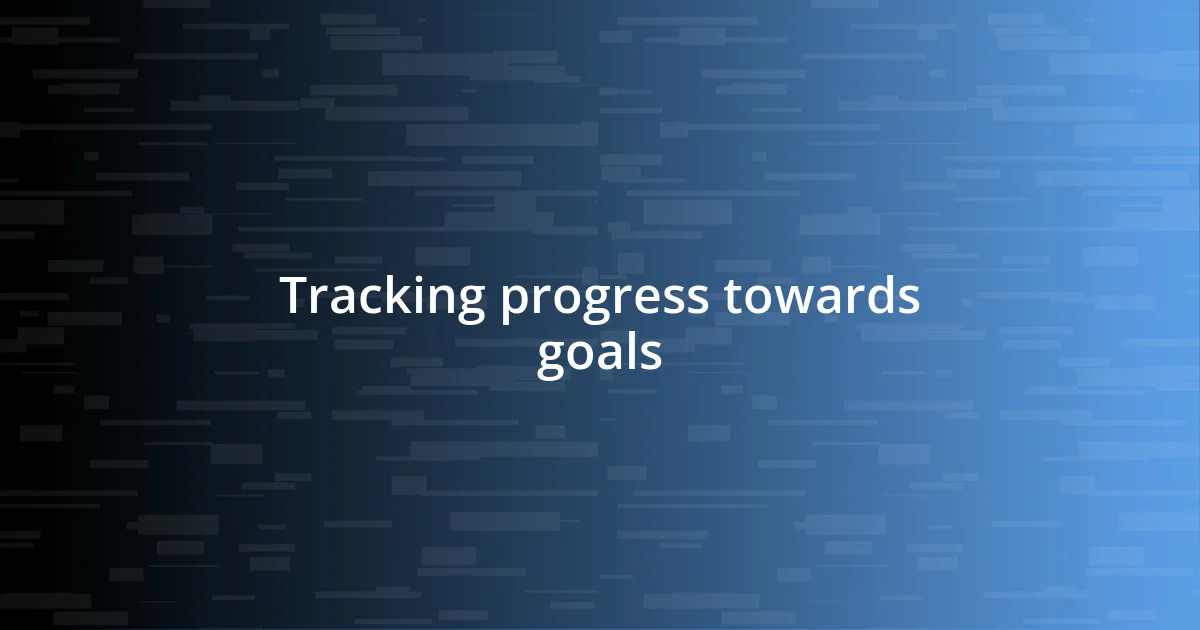
Tracking progress towards goals
Tracking my progress towards financial goals has been a transformative experience. I began by breaking my goals down into manageable milestones. Each month, I would sit down with a notebook—not just to check numbers, but to reflect on what those numbers meant for my journey. I vividly remember the exhilaration of crossing off the first personal savings goal. Have you ever felt that rush when you achieve something you’ve worked hard for? It’s like a little validation from the universe, affirming that you’re on the right path.
To keep myself accountable, I created a simple spreadsheet that visualized my progress. Not only did it track my savings and investments, but it also included my emotional reflections. I often noted how I felt about my advancements—joy when I hit a target or frustration when I fell short. This practice helped me understand my relationship with money and motivated me to adjust strategies as needed. How often do you take a moment to reflect on your financial journey? I’ve found that this reflective process has nourished my growth, making each goal feel less intimidating and more like stepping stones.
Celebrating small victories has been a crucial aspect of tracking my progress. I remember reaching my first $1,000 savings goal and treating myself to a small celebration. It taught me the value of recognizing achievements, no matter how small. This act of acknowledgment serves as a reminder that every step counts. Are you taking the time to celebrate your accomplishments, big or small? Embracing this mindset keeps my spirits high and reinforces my commitment to achieving financial freedom.












